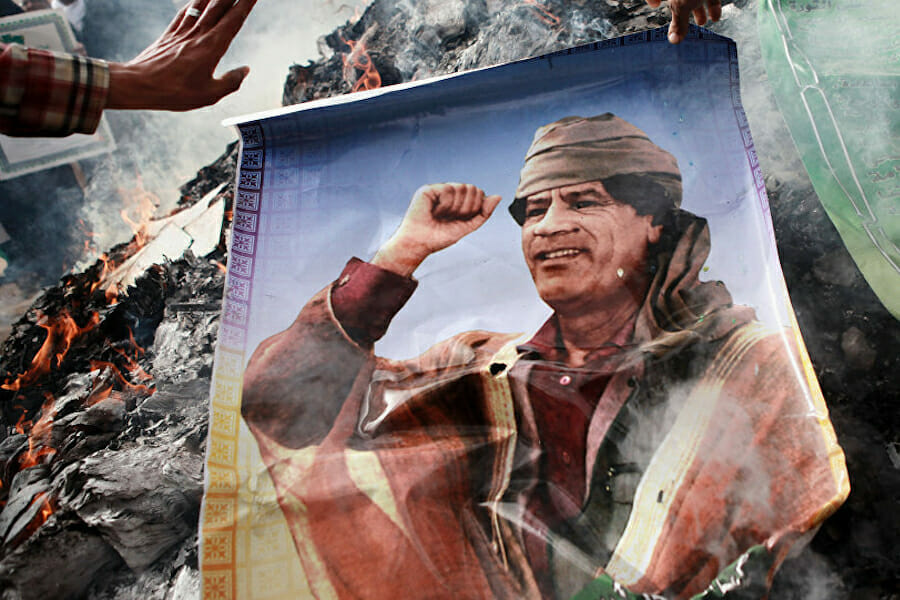
U.S. Should Recognize Allies’ Concerns about Libya
Attempts by the international community to end the civil war in Libya is failing to address critical issues: counterterrorism, and securing Libyan oil and natural gas for sale to Europe to bolster the continent’s energy security and to provide Libya funds for its reconstruction.
All parties to the fight have bogged down, so does the Trump administration have any options to help end the war – instead of just more of the same?
The April 2019 offensive of General Khalifa Haftar’s Libyan National Army (LNA) against militias in Tripoli has stalled, and the LNA has had to accept increased military support from Egypt, Russia, and the United Arab Emirates (UAE). Haftar’s opponent, Fayez al-Sarraj, chairman of the Presidential Council of the UN-recognized Government of National Accord (GNA), reneged on the GNA’s commitments made in Paris, then Palermo, and finally Abu Dhabi, for the peaceful unification of the Libyan Army with civilian oversight of the military. Also, the Sarraj government has been lax in its oversight of the national budget ($33.83 billion) and funds at the Central Bank of Libya (CBL), despite protests by the Auditor General. The GNA has accepted military aid from Turkey in the form of Syrian mercenaries and Turkish advisors.
The United Nations, which has tried to resolve the conflict, has not delivered the long-promised audit of public funds and of the central bank. Nor has it unveiled the nature, composition, and mandate of the “National Conference” it is preparing, despite repeated requests for transparency. In January, the latest round of peace talks collapsed, though that probably reflected the needs of the belligerents and was not a failure of the UN or European mediators. A UN mediator called the arms embargo of the country a “joke” which is true, but Haftar’s advocates will see the UN call for an end to violations as part of the international body’s support for Sarraj. Voting for a UN arms embargo is part of the pro forma response to any conflict even though many parties plan to violate it as their needs demand.
One place the antagonists are moving expeditiously is Washington, D.C., where the GNA and the LNA are retaining lobbyists and conducting media campaigns in hope of winning in U.S. government offices what they lose on the battlefield.
The first sign of the Trump administration’s reconsideration of support of the GNA came in April 2019 when President Trump approvingly spoke to General Haftar. More recently, administration officials had two meetings with Aref Ali Nayed, an Islamic scholar and former Libyan ambassador to the UAE. Nayed is allied with General Haftar, and has secured the backing of the UAE to be the prime minister of Libya. U.S. officials then met with Haftar in November 2019.
In a sign America’s foreign policy establishment may be reconsidering the U.S. role in the region, Martin Indyk, a veteran of the Middle East peace process, recently admitted: “The Middle East Isn’t Worth It Anymore.” This will confirm Trump’s remark in 2017 that “I do not see a role in Libya” and his desire (speaking in 2019 specifically of Syria but generally about the region) that “Let someone else fight over this long bloodstained sand.”
Trump reiterated this theme in the 2020 State of the Union address when he said, “It is also not our function to serve other nations as a law enforcement agency.”
If the U.S. has narrowing strategic interests in the region, and no equities in Libya, what should it do?
It should recognize that many friends and allies have keen interests in Libya. The GNA is backed by Turkey and Qatar; the GNA’s rivals, the elected House of Representatives (HoR) and the LNA are backed by the United Arab Emirates, Egypt, Russia, Saudi Arabia, Jordan, and France. Neighboring Algeria and Tunisia support reconciliation and are concerned about violent spillover. Italy, the former colonial power which has business and security interests in the country, has tried to remain neutral and has been marginalized by its own weak government and missteps.
Egypt, which shares a 700-mile border with Libya, is concerned that continuing instability will fuel the free movement of fighters, weapons, and contraband, and has secured support from the UAE and Saudi Arabia. France is concerned about instability (and migrants) crossing the Mediterranean. Russia is interested in Libya’s oil and gas reserves, reconstruction contracts, and establishing itself as a regional mediator. For the U.S., here is an opportunity to support four friends and start to work cooperatively with Russia, which has some moral authority by virtue of abstaining from UN Security Council Resolution 1973 which approved the 2011 attacks by the U.S., UK, France, and Canada that unseated Qadaffi and started the country’s slide into anarchy.
U.S.- Turkey relations are tense over the Erdogan regime’s increasing authoritarianism, and Qatar’s relationship with the U.S. is transactional. Both Turkey and Qatar support the Muslim Brotherhood, which has allies in the GNA and is uniformly opposed by Haftar’s supporters.
What should the U.S. do?
First, be aware of the needs of friends and allies. The U.S. doesn’t have a dog in this fight, but it should support friends and allies that do. Trump has roughed up some of America’s friends in recent years and this is an opportunity to help them on an issue that is – literally – at their door.
Next, maintain U.S. forces’ light footprint in Africa. French President Emmanuel Macron has asked the U.S. to not cut support for French forces in Africa. U.S. commanders are pushing back against planned cuts in U.S. forces in Africa and are making a case for more military, diplomatic, and economic involvement in the continent. France is one of America’s oldest ally and, unlike some other European countries, won’t dither when it spies a security threat so the U.S. won’t be yoked to a reluctant partner.
Lastly, look beyond Sarraj and Haftar. Sarraj doesn’t control much territory and is sympathetic to the Muslim Brotherhood, a surefire way to ensure that there is no daylight between his Arab opponents. Haftar is also a transitional figure – he’s 76, lives in a combat zone, and reportedly suffered a stroke in 2018. The important decision about what politician to back isn’t who is the best current guy, but who is the best next guy.
Haftar’s allies should continue to support him, but as part of a “tandem”: the senior military commander and a younger civilian politician with a good reputation in the country, but also a known coalition builder.
U.S. officials have already met with the “next guy” half of the tandem: Ambassador Aref Ali Nayed, an Islamic scholar and former Libyan ambassador to the UAE. Nayed has been unwavering in his support for the elected House of Representatives, the Transitional Government, the LNA, and in his commitment to stamping out Islamist terror. Nayed gained the trust of regional and global leaders through his ambassadorship to the UAE, his role as National Security Advisor to the prime minister of the Transitional Government, as well his role as operational head of the Libya Stabilization Team in 2011.
On a personal level, Nayed can connect the eastern and western halves of Libya. He was born in Benghazi and successfully chaired its largest football club (Ahly Benghazi), but was raised in Tripoli. Tribally, Nayed’s father is a Sheikh of the Wirfalla tribes, and his mother is from the Tarhuna tribes. His in-laws are a prominent family from Misrata settled in Benghazi. He also has social kinships with several families from the west, east, and south of Libya.
And Ambassador Nayed can help the formation of a national unity government that can create a political track emphasizing the delivery of urgent services to Libyan citizens, as well as timely and transparent elections.
In Libya, the U.S. can do well while doing good: it can support its friends and allies in the region; help establish a transitional government that will make an opening to young, energetic leaders who can lead the reconstruction of the country; and do so at a reasonable cost as it is still paying off the credit card debt for Iraq and Afghanistan.

